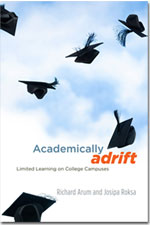There is a lot to cover on the first day of class. You establish procedures and convey expectations. You review the syllabus and, if you’re teaching a lab, safety protocol. You also spend some time teaching some material. While you might not make an assignment for the first day, you still should use some time on the first day to talk about your expectations for students’ work and how you assign grades.
Read more ›CURRENT ARTICLE • April 06
OTHER RECENT ARTICLES
End-of-course evaluations, conducted properly, can serve as valuable tools for improving online programs, but they’re not without their drawbacks.
Read More ›Academically Adrift is provoking plenty of discussion throughout American higher education, and with good reason. While there are valid concerns about the methodology, instrumentation and overreaching inferences of Richard Arum’s and Josipa Roksa’s research study, many of their conclusions are important ones that have been confirmed by others.
Read More ›Simon, who teaches very large economics classes wonders in a blog comment if the kind of facilitative learning described in the March 2 post is possible in mass classes. I’d like to use this post to address his query. First off, as any large course instructor knows, teaching those big, required, introductory courses is not easy. In fact, it may well be the most difficult teaching assignment given to teachers. In my mind this raises a host of intriguing questions about who should be teaching and taking those courses. But that’s a topic for another post.
Read More ›Is it me or do students often seem surprised by just how long the writing process takes? When I first started teaching, I never thought to address the issue of time management with my students. Over the course of my next several classes, however, I started to notice a pattern in students’ comments, such as: The work in this class is really, really time consuming; I’ve never spent this much time writing before; and I didn’t realize it would take SO much time but I am really happy with the end results.
Read More › The quest to identify the ingredients, components, and qualities of effective instruction has been a long one. Starting in the 1930s, researchers sought to identify the common characteristics of good teachers. Since then, virtually everybody who might have an opinion has been asked, surveyed, or interviewed. Students have been asked at the beginning, middle, and end of their college careers. Alumni have been asked years after graduating. Colleagues within departments and across them have been asked, as have administrators, from local department heads to college presidents.
The quest to identify the ingredients, components, and qualities of effective instruction has been a long one. Starting in the 1930s, researchers sought to identify the common characteristics of good teachers. Since then, virtually everybody who might have an opinion has been asked, surveyed, or interviewed. Students have been asked at the beginning, middle, and end of their college careers. Alumni have been asked years after graduating. Colleagues within departments and across them have been asked, as have administrators, from local department heads to college presidents.
As an undergrad I had a hard time settling on a major so I sampled a lot of different courses during my first couple of years. I remember signing up for one course that looked perfect because it combined two of my interests — media and American politics. In addition to learning about the changing dynamics between the two from a historical perspective, I was excited to see how the professor would incorporate the current presidential election into the course.
Read More ›I so appreciate the comments that are now appearing with some regularity on this blog. Thanks to those of you contributing. We have much to learn from each other.
Read More ›Community colleges are notorious for embracing pedagogical fads—what faculty members sometimes refer to derisively as “the flavor of the month.”
Read More ›While online discussion is generally deeper and more active than face-to-face discussion, even online discussions can eventually become a drudgery. Nobody likes reading long blocks of text online, yet discussion in an online classroom is text based.
Read More ›





